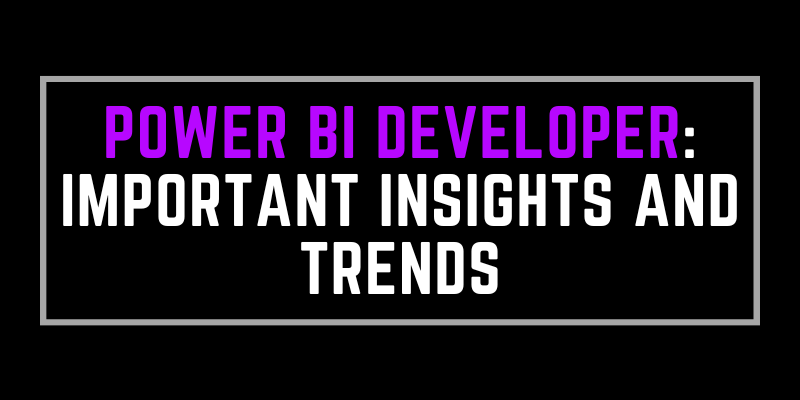
Power BI (Business intelligence) is the process of analysing data to derive meaningful insights and conclusions for a company. It enables businesses to derive knowledge, insights, and conclusions from massive data sets collected within and outside an organisation, cleaning and analysing the relevant data, preparing reports, and quickly and efficiently presenting them to management, stakeholders, and all related tyres of a company. In this blog, we will discuss Power BI Developer: Important Insights and Trends. Our Power BI Course in Chennai simplifies obtaining your Power BI certification while providing the best certification training with placement assistance.
Power BI was first introduced in 2011 (as Project Crescent), when it was released alongside SQL Server. Power BI for Office 365 was renamed in 2013. Power BI is a service, product, and application part of the Microsoft Business Intelligence (MSBI) suite.
Who is a Power BI Developer?
A Power BI developer is a professional who has received extensive Power BI training and is in charge of the development and administration of BI tools, as well as having a thorough understanding of the BI system. A Power BI developer uses these skills to transform raw data into meaningful insights through interactive and simple-to-understand dashboards and reports.
A Power BI developer’s roles and responsibilities vary by company. Still, typical responsibilities include:
- Designing and developing BI reports.
- Building data models.
- Analysing databases.
- Providing insights to improve decision-making, among other things.
Here is a summary of the responsibilities of a Power BI developer.
Power BI Developer Responsibilities
- Understanding the business requirements in the business intelligence radar, designing data models to transform raw data into meaningful insights.
- Identifying key performance indicators (KPIs) with clear objectives and monitoring them regularly.
- Converting business requirements into technical specifications with deadlines.
- Data analysis, chart creation, and report creation.
- Data preparation for tabular and multidimensional data models.
- Data documentation that includes all algorithms, parameters, models, and relationships.
- Using Power BI tools to create dashboards and interactive visual project reports.
- Creating a data warehouse.
- Creating detailed analytics by designing, developing, testing, and deploying Power BI scripts.
This is not an exhaustive list. Power BI developer responsibilities include many more technical aspects beyond this article’s scope. The responsibility includes managing the entire BI system and focusing on using Power BI to make smart, real-time decisions.
Enroll in the Microsoft Power BI Certification Online, Which will assist you in achieving Power BI Certification success.
After reviewing the duties, it is critical to comprehend the skills required for a Power BI developer to carry them out.
What Skills are Required for a Power BI Developer?
A Power BI developer must be knowledgeable in data science, business intelligence, data analytics, data integration, data warehousing, modelling, business intelligence, and presentation. The following list the skill sets required to become a proficient Power BI developer.
Technical abilities required of a Power BI developer
Data Analytics proficiency
The most fundamental skill of BI developers. This includes drilling down into data, visualising the big picture, and communicating to all organisational stakeholders in non-technical, jargon-free language.
BI Tools expertise
Experience with business intelligence tools and systems such as Power Bi, Tableau, SAP, and others is required. A Power BI developer must also have experience creating data-rich dashboards, writing DAX expressions, implementing row-level security in Power BI, developing custom BI products that require knowledge of scripting and programming languages such as R and Python, and finally the ability to convert data into stories that aid in the establishment of data-driven decision-making processes.
Data-specific roles
A minimal level of two or three years’ experience with BI tools or data-specific roles, including database management, SQL querying, data modelling, data warehousing, business intelligence, and OLAP (Online Analytical Processing).
BI Stack knowledge
Complete knowledge and experience with Microsoft Business Intelligence stacks such as Power Pivot, SSRS, SSIS, and SSAS will be required, as many large-scale companies in data warehousing, data management, analytics, reporting, and business intelligence use these.
Conclusion
This extensive blog has covered everything Power BI Developer: Important Insights and Trends, their required skills, and how they can develop them. Hopefully, this will bring the most recent and valuable insights to all aspiring to enter the Power BI profession and those who are already in it and want to advance their careers. The Power BI Training in Bangalore at FITA Academy will assist you in acquiring the necessary skills and project requirements.
Read more: Power BI Interview Questions and Answers
